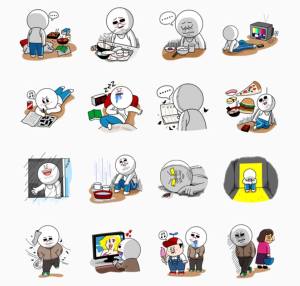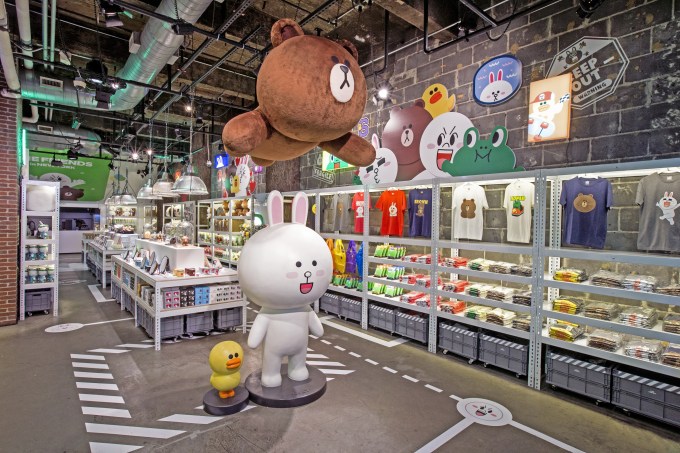Throughout history, every form of communication has developed its own shorthand.
Northern Renaissance paintings were rich in symbolism; even the most mundane detail, like a vase, was a rich allegory.
Victorians folded the corners of their calling cards to express sentiments ranging from congratulations to condolences.
Wireless telegraphists developed a system of coded slang to save their hands from the dreaded “morse finger.”
And now Line, a messaging app with 205 million monthly active users around the world, has stickers like this:

I live in Taiwan, where many WhatsApp users switched to WeChat and Line about three years ago, thanks in large part to stickers and emojis. At first I thought stickers were pointless—why waste time flipping through a library of cutesy pictures when you can type a response in seconds?
Then I saw that twisted party sticker above and realized I was wrong. Like symbols in Renaissance paintings, Line stickers express a wide, complex, and often bemusing array of ideas and emotions–and some are just really messed up, in an awesome way.
The Business Of Stickers
Line is spending a lot of money to transform its messaging app into a “lifestyle platform” filled with features like grocery deliveries and streaming music. Similar to strategies taken by other messaging apps like WeChat, KakaoTalk, and, more recently, Facebook Messenger, offering a wide range of services is meant to keep users engaged even after the novelty of free texting and voice calls wear off.
Line messaging app’s main sources of revenue, however, are still sticker packs and games. Its Creator’s Market, which lets third-party designers upload and sell stickers, made $75 million during its first year in business.
According to figures the company released for its fourth anniversary last month, up to 2.4 billion stickers and emojis are sent each day by its users. Almost half, or 48 percent, express happiness, but the rest reflect emotions ranging from sadness (10 percent) to anger (6 percent) and surprise (5 percent).
Many people in the U.S. and other Western countries make the same mistake I did of assuming that messaging app stickers are just cute. In a recent article about the Line’s initial public offering plans, Bloomberg referred to them as “teddy bear icons.”

Many of the Tokyo-based company’s stickers, however, tap into kimo-kawaii, a trend that combines kawaii, or cuteness, with darker emotions (“kimo” means gross or off-putting). Perhaps the best example of this is a series in which Moon, one of Line’s staple characters, sinks into a nadir while looking for a new job. As his bank balance dwindles to zero, Moon lets his apartment descend into squalor, passes time by watching what appears to be softcore porn, and attempts to make friends with a cockroach.
While kimo-kawaii is often described as a recent trend, it has deep roots in Japanese pop culture. A character called Gloomy Bear was designed as a blood-soaked response to Hello Kitty, but newer Sanrio characters like Gudetama, a chronically depressed egg, also tap into kimo-kawaii.
Questions remain about how well Line’s appeal will translate outside of its core markets, Japan, Taiwan, Thailand, and Indonesia, which account for more than half it users, especially as it preps for an initial public offering.
No matter how its business strategies perform, however, Line’s stickers are an example of how tech companies can influence and reinforce cultural trends, as characters created to sell a product take on a life of their own.
Scratching Beneath The Surface Of Cute
Like other designs that encapsulate kimo-kawaii, Line characters have an edge made palatable by their cuteness. Most—a brown teddy bear, a white rabbit, a green frog, a yellow chick—are like a crayon box filled with generic prototypes of cartoon characters. This makes them highly versatile.
 In a sticker pack, they might be engaging in bloodsport or forcefeeding each other cake, but in Line Friends stores, which have been set up in in the company’s main markets to sell stuffed animals, stationery, dishware, and other items, they appear as harmless as Hello Kitty.
In a sticker pack, they might be engaging in bloodsport or forcefeeding each other cake, but in Line Friends stores, which have been set up in in the company’s main markets to sell stuffed animals, stationery, dishware, and other items, they appear as harmless as Hello Kitty.
Line’s data records which stickers get used the most often, but not how recipients react to them. This presents a challenge, but also gives its designers more freedom. The company doesn’t have a specific demographic in mind when creating new packs. When Line first launched, however, the majority of its users were female high school students, says Naotomo Watanabe, the manager of Line’s sticker planning team in Tokyo.
As the app sought to widen its appeal, it began to expand its market tests to other groups. “Moon’s Job Hunting Story” was created for release in early spring, which marks the beginning of the fiscal year in Japan when many professionals are looking for new job opportunities.
Line, which now offers 140,000 sticker sets and 6,830 emoji, is busy figuring out how to monetize its characters in countries where its messaging app has not achieved dominance. For example, it recently launched Emoji Keyboard, which is targeted to users outside of Asia. The keyboard is packed with 3,000 stickers and emojis and, if it is successful, might attract people to other Line apps, including aillis (formerly called Line camera), its photo-editing app, games like Line Rangers, and even utility apps like Line Antivirus and Line Tools.
Mobile Messaging’s Lingua Franca
In a text conversation, stickers are bids for connection that take even less effort than gifs or emoticons. They make it easy to express feelings you can’t (and probably shouldn’t) spell out in words.
Other messaging apps with stickers that capture the essence of kimo-kawaii include Facebook’s Sinister Oyster and HamCat packs.
 Line’s stickers stand out, however, because they feature a group of characters with storylines that are relatively complicated—or at least substantial enough to provide fodder for a cartoon series called “Line Town” and manga series. To be sure, some of Line’s sticker packs are cute in a straightforward way, like “Brown and Cony’s Lovey Dovey Date,” with the two title characters, a bear and white rabbit, engaging in romantic outings, romping on the beach, and applying bandages to each other’s boo-boos.
Line’s stickers stand out, however, because they feature a group of characters with storylines that are relatively complicated—or at least substantial enough to provide fodder for a cartoon series called “Line Town” and manga series. To be sure, some of Line’s sticker packs are cute in a straightforward way, like “Brown and Cony’s Lovey Dovey Date,” with the two title characters, a bear and white rabbit, engaging in romantic outings, romping on the beach, and applying bandages to each other’s boo-boos.
Though many of Line’s stickers are sweet and innocent, some are as exaggeratedly violent as the craziest “Ren and Stimpy” or “Beavis and Butthead” cartoons. One sticker shows Sally engaging in cannibalism, eating a drumstick while guzzling wine directly from the bottle. There is a limit to the kinds of situations that Line can show, however, and it varies from region to region. For example, in countries where there is a large Muslim population, Line doesn’t sell stickers showing drunk characters.
Watanabe says the storylines and relationships between characters sprang up by accident.
“Originally we weren’t thinking of creating characters for Line. We were thinking about the optimal solution to create effective stickers. We came up first with Moon, which we thought was the most simple way to bring expressions into our stickers,” Watanabe told TechCrunch through a translator. “Then we wanted to create stickers with more personality, so we came up with female and male characters, like Cony and Brown.”
As Line produced new sticker packs, relationships and personalities began to develop. For example, Brown, a stoic bear, is engaged in a sometimes tumultuous relationship with Cony, a white rabbit with a romantic disposition. Sally, a small yellow chick, is “a little bit of a sad character,” says Watanabe, and the frequent target of abuse from other characters, who like to bat her around like a baseball or use her as furniture.
The cake party sticker seems random at first glance, but Sally is getting the upper hand for once. It is Line’s answer to the beheading of Holofernes by Judith, a popular subject in paintings from the Renaissance and Baroque eras, a creepy-cute meditation on anger and revenge for the mobile era.
“Line Characters Blow A Fuse’ were originally created to convey anger,” says Watanabe. “In Japan, that sticker set represents a hidden but lingering anger that you can’t really show, a passive-aggressive kind of anger. That’s probably Sally’s imagination. Sally is imagining doing things in her passive-aggressive way. Sally is always being defeated, she’s always the victim in many cases, so I think in that particular sticker, she’s winning.”






























Comment